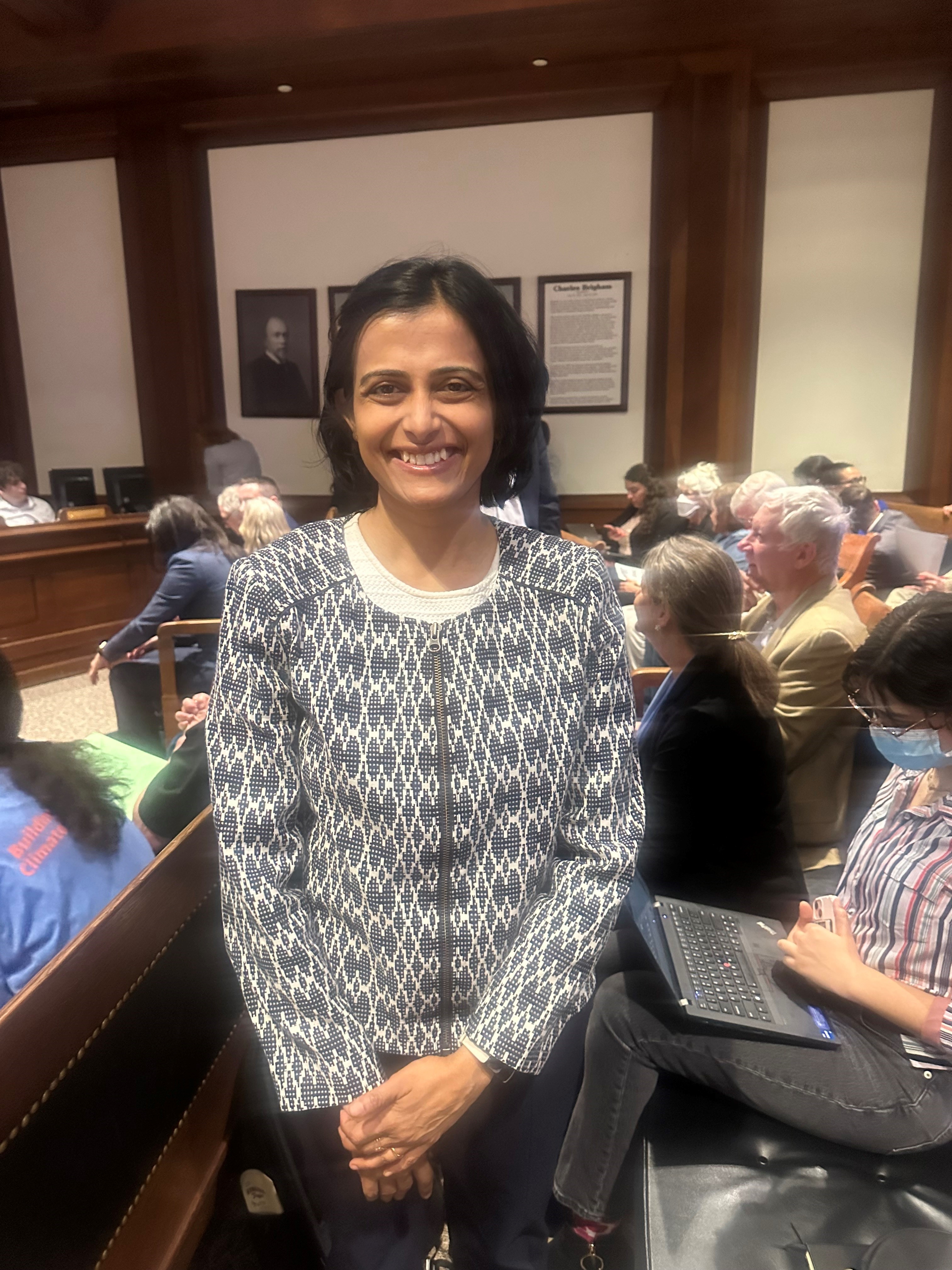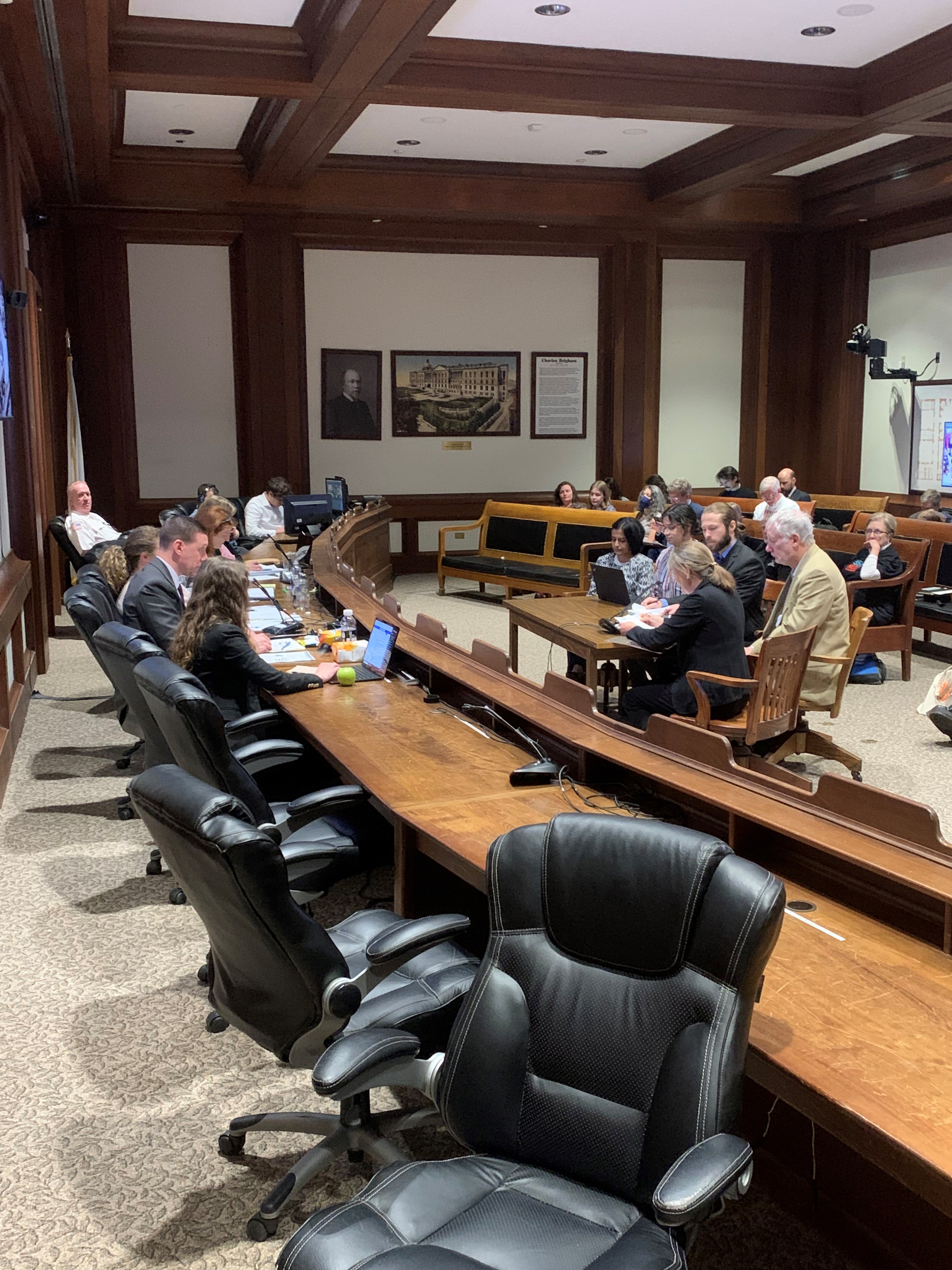Thank you to Indrani Ghosh, Ph.D., for representing ACEC/MA.
 |
 |
Indrani Ghosh, PhD, Resiliency Senior Technical Leader at Weston & Sampson, testified in support of several bills on behalf of ACEC/MA at the May 17, 2023 public hearing of the Joint Committee on the Environment and Natural Resources at the State House. (photo credits: Abbie Goodman, John Nunnari)
Fact Sheet on the issue from Trustees and coalition partners
Indrani Ghosh's Oral Testimony at the hearing with links to resources.
ACEC/MA is part of a coalition led by the Trustees of Reservation supporting several bills this legislative session. The goal of these bills is to eliminate the increasing risk of catastrophic flood damage to individuals, families, small business, neighborhoods, infrastructure and first responders, and to help property owners and renters to move out of harm’s way, while permanently conserving and restoring lands and waters to restore habitat and climate resiliency functions and provide outdoor recreational opportunities for the public.
Resolve S.557, Resolve to create a commission to determine the feasibility of voluntary acquisition of flood risk properties and structures, (Senator Marc Pacheco)
H. 876, An Act to create a commission to determine the feasibility of voluntary acquisition of flood risk properties and structures (Rep. Sarah K. Peake),
S.559 An Act establishing a Massachusetts Flood Risk Protection Program
Coalition Members
Trustees of Reservation
The Nature Conservancy
Environmental League of Massachusetts
Massachusetts Land Trust Coalition
Massachusetts River Alliance
Massachusetts Association of Conservation Commissions
Appalachian Mountain Club
Conservation Law Foundation
Mass. Audubon
Metropolitan Area Planning Council
American Council of Engineering Companies of Massachusetts (ACEC/MA)
These organizations strongly support passage of S.557/H.876, An Act to create a commission to determine the feasibility of voluntary acquisition of flood risk properties and structures, and S.559, An Act establishing a Massachusetts flood risk protection program.
Climate change is causing sea level rise and more frequent rainfall and intense storms. By 2050, nearly 50,000 Massachusetts homes will face a substantial risk of structural damage from flooding resulting in at least $300 million in financial losses every year. Adapting to the negative impacts of climate change depends on our willingness to proactively plan, invest, and act as a Commonwealth to reduce loss of life and property damage and protect natural resources by addressing the increasing flood risks today and into the future.
Engineered flood protection methods such as seawalls, levees, deployable flood walls and dunes may not be affordable, feasible or cost-effective investments for mitigating severe and repetitive flood losses caused by overflowing rivers, coastal flooding, storm surge, and sea level rise. Instead, communities are increasingly looking for a more permanent solution to alleviate flood risks. A key community resilience tool is property buyouts. Buyouts are a proven, sustainable climate adaptation strategy involving tenants and interested property owners who are voluntarily looking to relocate to safer ground. When done right, buyouts can promote equitable outcomes, while playing a critical role in flood mitigation efforts. Buyouts are just one flood preparedness strategy among many – others include resilient and flood resistant building code standards, municipal land use ordinances, and zoning requirements. Yet pre-disaster buyouts stand out among these options because they permanently prevent future property damage, eliminate uninsured losses, keep residents and first responders safe, protect neighborhoods, and are more affordable than post-disaster relief.
Well-planned, pre-disaster buyouts that include community involvement and relocation support are often the only solution available for people with no other options, including low-income homeowners, renters, and Environmental Justice (EJ) Populations. Some homeowners lack flood insurance or could experience double-digit increases to flood insurance premiums. Many renters and homeowners cannot afford to retreat, rehabilitate, or rebuild when extreme weather damages or destroys property. After a disaster, residents, first responders, and community leaders are often overwhelmed, under-resourced and even traumatized. In addition, municipal property tax revenues may experience a significant decline after a natural disaster that may take several years to recover. Moreover, there are major social costs following a damaging storm. Lower income residents may be part of a mass exodus and experience loss of their home, employment, and income, as well as access to their doctors, childcare providers, and schools. A well-established and economically equitable pre-disaster property buyout program in Massachusetts can be designed to eliminate these and other social costs.
Buyout projects are relatively affordable when compared to the long-term costs associated with rebuilding, and public expenses to repair infrastructure. They are a one-time investment to acquire property at fair market value (pre-damage) and help willing property owners and renters to voluntarily relocate to a safer location. These projects can provide community and public benefits when coastal zones and floodplains are ecologically restored to pre-development conditions and designed as nature based solutions to buffer communities from climate impacts. Conserved natural areas provide critical ecosystem services, such as drinking water supply protection and habitat conservation, as well as new parks, trails and beaches that provide outdoor recreational opportunities.
The Federal Emergency Management Agency (FEMA)’s Building Resilient Infrastructure and Communities (BRIC) program supports buyout projects by offering communities pre-disaster hazard mitigation funds. However, BRIC funds are insufficient to address the mounting risks nationwide. For example, in FY23, Congress allocated just $233 million for BRIC to cover the entire nation. Post-disaster FEMA and other federal programs are often inequitably applied, and no federal emergency relief programs prioritize EJ communities. Also, nonprofit land trusts and conservation organizations - important project partners - are not permitted to apply directly for FEMA funds. And the FEMA process is slow, limited, and difficult to access; it can take up to a decade to complete a FEMA project.
Some state and local governments have stepped up to address local problems that federal agencies cannot fix. North Carolina and New Jersey, as well as Nashville and Davidson County, Tennessee; Birmingham, Alabama; Harris County, Texas; Austin, Texas; and Charlotte-Mecklenburg County, North Carolina have all created pre-disaster property buyout programs. While Massachusetts lawmakers authorized $50 million for a coastal buyback program in the 2014 and 2018 Environmental Bond bills, and created a climate adaptation management plan and Municipal Vulnerability Preparedness 2.0 program, state funds have not yet been invested in property buyouts, and a comprehensive pre-disaster property buyout program does not yet exist in Massachusetts.
Representative Sarah Peake and Senator Marc Pacheco are leading the effort to address this problem. As the chief sponsors of An Act to create a commission to determine the feasibility of voluntary acquisition of flood risk properties and structures, Senator Pacheco and Representative Peake are requesting that a new, temporary commission will be created to assess the advantages and disadvantages of voluntary acquisition of flood risk properties and structures across the Commonwealth, examine the feasibility of such a program, and identify its components. The state climate chief, secretary of energy and environmental affairs, and the director of the state emergency management agency would jointly implement and oversee the commission’s work. Senator Pacheco is also the chief sponsor of the Massachusetts Flood Risk Protection Program legislation that would require the creation of a new statewide voluntary property buyout program.
The goal of these bills is to eliminate the increasing risk of catastrophic flood damage to individuals, families, small business, neighborhoods, infrastructure and first responders, and to help property owners and renters to move out of harm’s way, while permanently conserving and restoring lands and waters to restore habitat and climate resiliency functions and provide outdoor recreational opportunities for the public. We support these bills and respectfully request that you give a favorable report to S.557/H.876 and S.559.
ACEC/MA members only pay the ACEC/MA member rate for registration. Check the ACEC/MA Member Directory to see if your firm is an ACEC/MA member. If your firm is an ACEC/MA member, you are a member.
Important: You must use the account, including the username and password, of the individual you wish to register.
Forgot your password? | Need an account?
IMPORTANT: Altering your name or contact information during registration will overwrite your record in our membership database. Please do not share your login information with anyone else.
If you have additional questions regarding registration, contact us at 617/227-5551 or acecma@engineers.org.
Registration is processed through the ACEC/MA associated website, www.engineers.org. ACEC/MA is supported by the staff of The Engineering Center Education Trust.